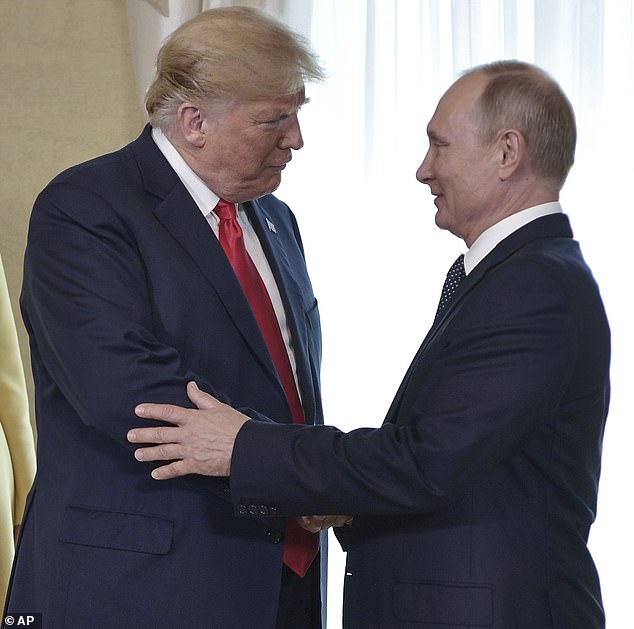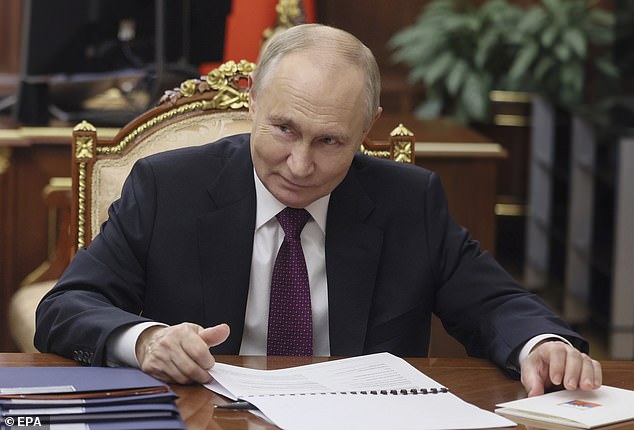Vladimir Putin is a savvy Trump-whisperer. He knows exactly what flavours of flattery to employ, what enticements to offer.
The US President is arguably the most powerful and influential leader in the world, but he craves the approval of his peers. He admires Putin’s strong-man image and wants to be a member of that club.
Putin is not the grandmaster of three-dimensional chess that some pundits make him out to be. But simply by setting foot on American soil today, he will be the winner in a high-stakes geopolitical game.
This is his first visit to the US since 2015, when Barack Obama was trying to isolate Russia from the rest of the world at the UN General Assembly.
That was a brutally awkward occasion for both leaders. This time, the Russian media is playing up the notion of a thaw in Russian-American relations, with the prospect of renewed business deals as well as peace talks.
Putin is emphasising his credentials as an international statesman, the head of a superpower that commands fear and respect.

Vladimir Putin is a savvy Trump-whisperer. He knows exactly what flavours of flattery to employ, what enticements to offer (President Donald Trump and Mr Putin in 2018)
That strengthens his domestic standing, no matter what the outcome of the talks. He need make no concessions because he can afford to walk away from the table.
His opening position, therefore, will be aggressive and ambitious. This is the Russian way, and it is one Trump often deploys himself: begin with outrageous, intimidating demands in order to force the opponent on to the back foot. Then haggle and make a great show of give-and-take, without ever yielding a genuine compromise.
To outside observers, it might seem the most Russia could expect is to keep the 20 per cent of Ukraine it has occupied by military force over the past three-and-a-half years. But Putin wants much more.
He will almost certainly try to insist that Kyiv cede more territory, land that will otherwise be invaded and conquered yard by bloody yard.
He will want to impose limits on the size of Ukraine’s standing army in future, to ensure his forces are met with less resistance if and when he renews his offensive.
Of course, he will permit Ukraine to make no military alliances – membership of Nato is out of the question – although he has signalled that he would have no objections to it joining the European Union, presumably thinking this would bring economic and political disruption with it.
And as a pre-condition for any ceasefire, he will ask for most of the US sanctions to be lifted, in return for access to Russian oil. In other words, Putin’s conditions for a ceasefire will amount to total victory.
The chief danger is not that the US will refuse to comply. If talks reach an impasse, Putin will appear all the stronger, while Trump will have failed as a deal-maker – something his ego can never permit.

Putin is emphasising his credentials as an international statesman, the head of a superpower that commands fear and respect
But it’s possible that Putin, who has become Russia’s absolute ruler during more than 25 years in power, will be tripped up by his own ego. He is surrounded by yes-men who don’t dare tell him the truth – as evidenced by his initial conviction that the ‘special operation’ to annex Ukraine would be over within three days and that his troops would be greeted as liberators.
He sometimes displays a cringey lack of self-awareness – though not on the scale of Trump’s inability to moderate his behaviour. When the Russian dictator agreed to be interviewed by fawning American broadcaster Tucker Carlson last year, Putin began with a long and rambling lecture about the historic status of Ukraine as a Russian province. If he repeats that performance, Trump will lose patience very quickly.
But it is impossible to envisage a meltdown from either man. Putin has a keen sense of how far to goad an opponent. At a meeting in 2015 at the Vatican, he kept Pope Francis waiting for over an hour – a tactic he uses against many political opponents as a none-too-subtle show of disdain.
On the other hand, he has never been late for a meeting with the far more powerful President Xi Jinping of China.
Some of his gamesmanship is simple bullying. During talks in 2007 with Angela Merkel, then Germany’s Chancellor, he notoriously had his labrador Konni brought into the room and casually allowed it to sniff her – knowing she was terrified of dogs.
He will not attempt such macho posturing with Trump. But he may well hint at an underlying contempt. He respects sober, serious politicians and, while Trump no doubt covets Putin’s stolen billions (the Russian may, in fact, be the richest man in the world), he sees himself as the CEO of United States Incorporated, and other nations as real estate.
Putin once described the US President as yarki. Told that this translated as ‘bright’, Trump was delighted. But in Russian the word actually means ‘colourful’, and that’s an ambiguous compliment at best. As ever, what Putin says today, and what he really means, might be two very different things.
Mark Galeotti is honorary professor at the University College London School of Slavonic and East European Studies.












